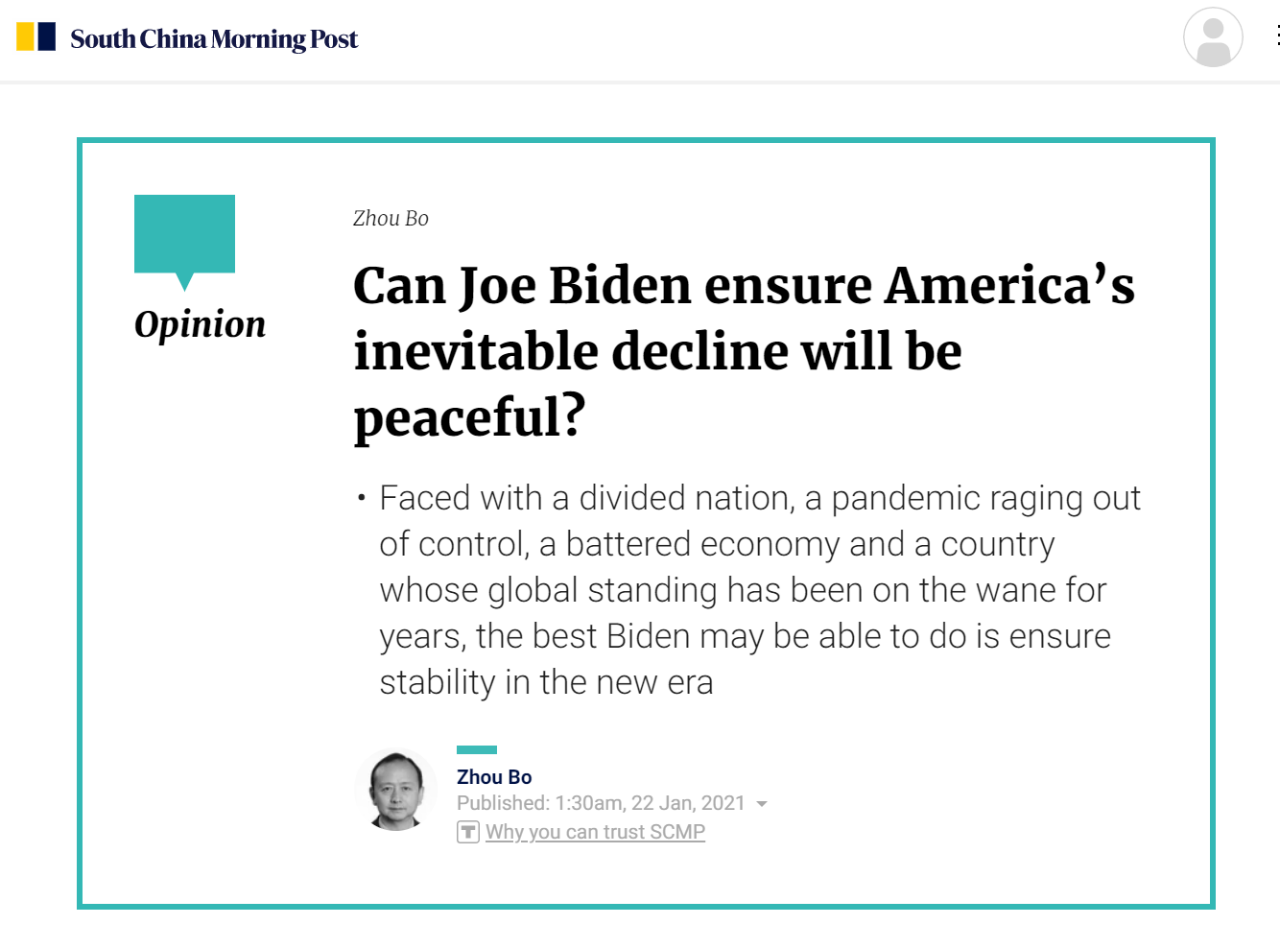
Joe Biden has been elected 46th president of the United States. Donald Trump, his predecessor, has been impeached for a second time. Both events are good news.
Looking back at the four years of the Trump administration, one might wonder why a man who made an average of 20 false and misleading claims a day and eventually incited a mob to storm the Capitol could have been elected as president of the most powerful country on Earth. Why was he supported by 74 million American voters in November’s presidential election?
Two years ago, I argued that the greatest challenge we face in the 21st century is not China’s rise, but America’s decline. China’s rise so far has been peaceful, but can the United States’ decline be equally peaceful?
If the Pentagon’s unabated military interventions after the Cold War have reduced the US’ national strength – a point few seem to disagree with now – they also show that the US’ decline, however gradual, is far from stable.
Then US Senate minority leader Chuck Schumer declared that January 6, 2021, could be added “to that very short list of dates in American history that will live forever in infamy”. It is more than that. The siege of the Capitol shows that when a democracy is in decline, it may become vitriolic and violent.
The bad news is Trumpism will not easily go away. Impeachment, without putting Trump on trial, does not prohibit him from running for president again in 2024. As the headline of an article in Time warned in November, “Even if Biden won, he would govern in Trump’s America”.
With the second-highest number of votes in US history going to Trump, the US seems bitterly and almost evenly split down the middle.
“History never repeats itself, but it rhymes,” as Mark Twain is often reputed to have said. Biden might now find himself in a situation echoing that faced by Abraham Lincoln, American’s 16th president, after the civil war when the nation awaited healing.
But while Lincoln’s America needed nothing more than national reconciliation, which the US today needs too, Biden has to fight domestic enemies as well as take on challenges ranging from curbing the spread of the pandemic and saving the battered economy to restoring racial justice and faith in institutions all at once.
How long will that take? And how much can this 78-year-old “good man”, as former US president George W. Bush called him, accomplish? Even if he has a mission, as he should have, he can hardly be Moses who led the Israelites out of Egypt.
He is more likely be the man who will lead Americans as they descend, however unwillingly, from the “city upon a hill”.
This is what he probably instinctively sensed when he said, “American history isn’t a fairy tale with a guaranteed happy ending. But we have the power to write the future we want for this nation.”
Overseas, his job seems easier, in part because the American people are weary of the endless wars their soldiers have been fighting and their duty as the world’s policeman in faraway places. The pandemic, coupled with the violence triggered by George Floyd’s death and the riot at the Capitol, will increase Americans’ worries about the future.
According to a national survey conducted by the Upshot and Siena College last year, Americans aren’t so much fretting about themselves as they are anxious about the country. A retreat to isolationism looks inevitable.
Biden has already announced the US’ re-entry into the Paris climate accord and World Health Organization, which he had promised to do “on day one”.
But rejoining the nuclear deal with Iran will be tougher. Iran is expected to demand a high price to return to the deal. According to The New York Times, the “breakout” time for Iran to possibly make a nuclear weapon – an ambition it denies – is now shorter than a year.
Unlike Trump, who called the European Union a “foe”, Biden will embrace the US’ allies. But, despite the rhetoric, the enthusiasm that characterised the relationship in the past has dimmed.
Much has been said about European “strategic autonomy”, a concept which has triggered more alarm, disagreement and mockery than appreciation. But the core issue is that Europe regards itself as a world power, and the US looks increasingly unreliable to Europeans. It remains to be seen how Biden will convene the much-touted summit of democracies.
It is a bit of a stretch to imagine how he might deliver a speech that doesn’t look like a joke against the backdrop of the US’ tarnished image.
Then, there is competition with China. In the era of great power competition, as defined by the US, if the two nations can only cooperate on a couple of things, such as climate change and crisis management, then we are effectively in a new cold war since America and the Soviet Union also managed sporadic cooperation on things such as eradicating smallpox and space exploration.
Sadly, the two largest economies in the world cannot even agree on working together to address the Covid-19 pandemic.
Competition with China is one of Trump’s main foreign policy legacies and is backed by bipartisan consensus. Biden can hardly thwart it, but he can save China-US relations from going into free fall.
Precisely because the relationship has already deteriorated significantly, Biden could return it to normality by moving in the opposite direction from Trump.
A good example is the investment agreement that China and Europe signed after seven years of negotiations. Wouldn’t a similar China-US trade deal be better than Trump’s unsuccessful trade war with China?
When he announced his presidential campaign in 2019, Biden said, “History will treat this administration’s time as an aberration”. Now he has a chance to change the country’s course.
This article was first published in South China Morning Post.
Click here for related two articles:
http://ciss.tsinghua.edu.cn/info/Opinions/3036
http://ciss.tsinghua.edu.cn/info/Opinions/3037
